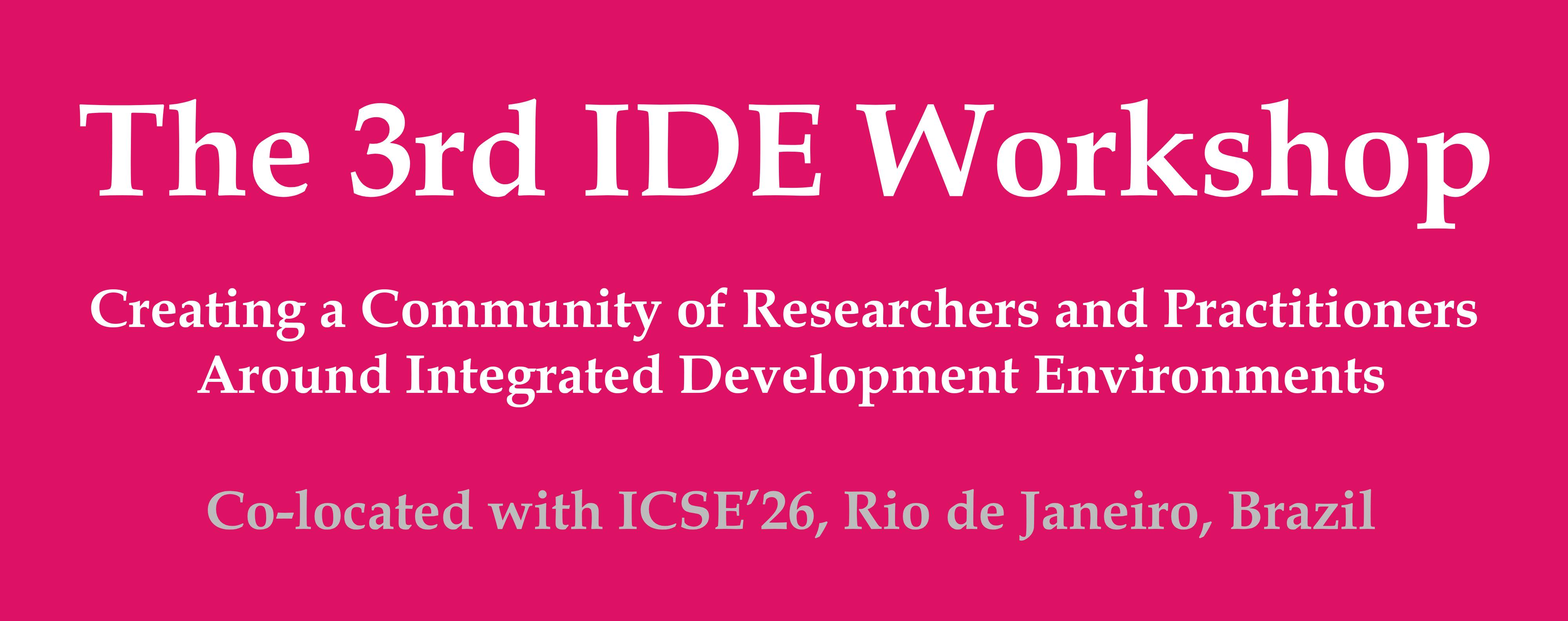
News
- December 18th: the list of accepted papers published at the website
- December 8th: after one major revision, the workshop accepted 11 submissions (8 short papers and 3 extended abstracts)
- October 27th: the workshop received a total of 11 submissions
- October 17th: the submission deadline extended to October 27th, 2025, notification deadline pushed to November 28th, 2025
- September 4th: workshop scheduled for Saturday, April 18th
- July 23rd: HotCRP opened
- July 4th: workshop accepted to ICSE’26!
- June 23rd: workshop proposal sent to ICSE’26
- June 23rd: the website is up
About the workshop
The 3rd International Workshop on Integrated Development Environments (the IDE Workshop) is the prime venue for uniting researchers and practitioners in their shared passion for IDEs and developers’ productivity. The previous editions of the workshop (IDE’24 and IDE’25) attracted many papers and resulted in fantastic discussions! In our post-workshop survey, the participants commented on the value they received, saying:
- “A lot of meaningful connections, including academy-to-industry, inspiring discussions”,
- “Lively and friendly atmosphere! The strong industry presence definitely makes discussing the topics more interesting”.
You can find a more detailed list of topics of interest in the Call for submissions below. The workshop is co-located with ICSE’26. The most important information relevant to the entire conference is available by following these links:
Program
Will be published later!
Keynotes
“Does JetBrains Dream of HAX? Human-AI Experience in the IDE, Today and Tomorrow”

by Agnia Sergeyuk, Team Lead of Human-AI Experience (HAX) Research at JetBrains Research!
AI tools in software development are changing faster than the research behind them. This talk covers shifts in how developers interact with AI inside the IDE. For each shift, we look at what the research community currently knows, what remains open, and what ongoing JetBrains studies contribute to the picture. The talk will end with explicit research bets on timelines and impact, and a set of questions the field has not yet answered.
Accepted papers
- MigMate: A VS Code Extension for LLM-based Library Migration of Python Projects — Matthias Kebede, May Mahmoud, Mohayeminul Islam, Sarah Nadi.
- From Detection to Prevention: Explaining Security-Critical Code to Avoid Vulnerabilities — Ranjith Krishnamurthy, Oshando Johnson, Goran Piskachev, Eric Bodden.
- Optimizing an IDE for an Evolving Language Ecosystem — Adam Welc, Todd Nowacki, Dario Russi, Cameron Swords, Tim Zakian.
- SmartDoc: A Context-Aware Agentic Method Comment Generation Plugin — Vahid Etemadi, Gregorio Robles.
- Proto-ML: An IDE for ML Solution Prototyping — Selin Coban, Miguel Perez, Horst Lichter.
- Protecting Private Code in IDE Autocomplete Using Differential Privacy — Evgeny Grigorenko, David Stanojevic, David Ilic, Egor Bogomolov, Kostadin Cvejoski.
- Forecasting Developer Environments with GenAI: A Research Perspective — Raula Gaikovina Kula, Christoph Treude, Xing Hu, Sebastian Baltes, Earl T. Barr, Kelly Blincoe, Fabio Calefato, Junjie Chen, Marc Cheong, Youmei Fan, Daniel M. German, Marco Gerosa, Jin L.C. Guo, Shinpei Hayashi, Robert Hirschfeld, Reid Holmes, Yintong Huo, Takashi Kobayashi, Michele Lanza, Zhongxin Liu, Olivier Nourry, Nicole Novielli, Denys Poshyvanyk, Shinobu Saito, Kazumasa Shimari, Igor Steinmacher, Mairieli Wessel, Markus Wagner, Annie Vella, Laurie Williams, Xin Xia.
- In-IDE Toolkit for Developers of AI-Based Features — Yaroslav Sokolov, Yury Khudyakov, Lenar Sharipov, Andrei Gasparian, Parth Tiwary, Artem Trofimov.
- Detecting UX Smells in Visual Studio Code Using LLMs — Andres Rodriguez, Juan Cruz Gardey, Alejandra Garrido.
- It’s Alive! What a Live Object Environment Changes in Software Engineering Practice — Julián Grigera, Steven Costiou, Juan Cruz Gardey, Stéphane Ducasse.
- Control Models for In-IDE Code Completion — Aral de Moor, Yana Hrynevich, Hleb Badzeika, Vladyslav Furda, Marko Kojic, Artem Savelev, Kostadin Cvejoski, Darya Rovdo, Ekaterina Garanina.
Call for submissions
Despite the desire of the research community to improve the productivity of software developers, it is challenging for research to move beyond papers into the everyday practice of software development. Since IDEs are among the most widely used tools in developers’ toolkit, they remain a crucial opportunity for research to reach this goal. To close the gap between research and adoption in practice, we launched the IDE workshop series. We build upon the momentum from our first two editions of the workshop and aim to exceed expectations at our third instance at ICSE’26.
At our workshop, we aim to bring together researchers and practitioners, and foster the community that really cares about IDEs. The researchers can exchange their ideas about using IDEs as a means for their work, as well as inspire each other on how to push the IDEs to the max: different visualizations, different ways of interacting with the users, unconventional methods of employing IDEs for data collection, for education, etc. In the meantime, having IDE developers in the mix allows the conversation to remain practical: IDE developers can learn state-of-the-art science but also communicate what it is they look for in research. Let’s shape this community together!
Topics of interest
Our target audience includes both academic researchers and IDE developers from industry.
From the research side, we welcome any contributions that relate to IDEs, in the form of short papers (up to 6 pages, including references, can be fewer) or shorter extended abstracts (up to 4 pages, including references, free of APC charges). The topics include, but are not limited to:
- The development of plugins, add-ons, and extensions for IDEs.
- Integrating prototypes or machine learning models into the IDEs.
- Using advanced AI, LLMs, AI agents, etc. in the IDEs.
- Improving various IDE features, such as automated refactorings, quick fixes, etc.
- Program and static analysis inside the IDE.
- UI/UX studies of working in the IDE, analyzing the way people use IDEs, their workflow, activities, attention, eye movement, etc.
- Visualizations in the IDEs.
- Using IDEs to analyze software development activities by collecting usage data.
- Insights and case studies of teaching various SE concepts (e.g., program comprehension, refactoring, testing, debugging, etc.) using IDEs.
- Different types of IDEs, unusual coding formats, novel IDE paradigms, and other potential visions of the future for the field.
- Anecdotal experience about why a certain tool or research approach was not implemented on top of IDE infrastructure, what the blockers were, and how the IDEs can improve to become more convenient for prototyping.
- And others!
From industry, we invite the developers of IDEs to share:
- What exactly they are looking for in contributions from the research community.
- What researchers can do to increase the chance of integration into the existing IDEs.
- Insights about IDEs that researchers can use to accelerate their research development or could use for education.
We are open to the developers of other industrial solutions that operate outside IDEs (e.g., as standalone services) to understand what precludes tighter integration with the rest of the development tooling and how IDEs can improve.
We want to foster an inclusive community that is welcoming not only established academic researchers but also industry participants who might not be familiar with writing academic papers. Thus, we invite IDE builders to contribute short extended abstracts (up to 4 pages, including references, free of APC charges) in free form, and we ourselves can help with their formatting.
We invited developers and project managers of several IDEs (IntelliJ, Visual Studio, Eclipse, NetBeans, VS Code, AndroidStudio, etc.) to foster a fruitful discussion that can result in practical collaborations. Please join us, share your perspective, and take part in growing the community that cares about practical impact and improving the lives of software developers!
Submission process
The information about the paper template and the relevant ACM/IEEE policies can be found on the
main ICSE page with submission information.
Submissions must conform to the ACM Proceedings Template page.
The following LaTeX code can be placed at the start of the LaTeX document: \documentclass[sigconf,review]{acmart}.
The IDE workshop employs the single-blind review process, i.e., you do not need to conceal your identity. The workshop accepts:
- short papers (up to 6 pages, including references, can be fewer). This format might require you to pay the APC charge for ACM Open, please refer to the main ICSE page for more information.
- extended abstracts (up to 4 pages, including references, free of APC charges).
Purchases of additional pages in the proceedings are not allowed.
Papers must be submitted electronically by the defined deadline (see important dates below) on HotCrp: https://icse2026-ide.hotcrp.com/.
If your paper is accepted, the list of authors cannot be changed but mistakes in the author names can be fixed. Titles can be changed with the approval of the program chairs. At least one author of each accepted paper should register for the workshop and present the paper at the workshop. If you have any questions, do not hesitate to contact the general chair for any inquiries (see contacts below).
The official publication date is the date the proceedings are made available in the ACM or IEEE Digital Libraries. This date may be up to two weeks prior to the first day of ICSE 2026. The official publication date affects the deadline for any patent filings related to published work.
Important dates
- Papers submission deadline:
October 20th, 2025October 27th, 2025 - Papers acceptance notification:
November 24th, 2025November 28th, 2025 - Camera ready deadline: January 26th, 2026
- Workshop: April 18th, 2026
Organizing committee
General chair, main contact person: Yaroslav Golubev, JetBrains Research.
Please contact me at yaroslav.golubev@jetbrains.com.
Program co-chair: Danny Dig, University of Colorado Boulder & JetBrains Research
Program co-chair: Nikolaos Tsantalis, Concordia University
Publicity co-chair: Katie Fraser, JetBrains Research
Publicity co-chair: Mauricio Verano Merino, Vrije Universiteit Amsterdam
Program committee
- Iftekhar Ahmed, University of California, Irvine
- Egor Bogomolov, JetBrains Research
- Markus Borg, CodeScene
- Charlotte Brandebusemeyer, Hasso Plattner Institute, University of Potsdam
- Malinda Dilhara, Amazon Web Services
- Noopur Gupta, Eclipse IDE, IBM
- Maliheh Izadi, Delft University of Technology
- Oshando Johnson, Fraunhofer IEM
- Rainer Koschke, University of Bremen
- Juan de Lara, Universidad Autónoma de Madrid
- Goran Piskachev, Amazon Web Services
- Raluca Sauciuc, Google LLC, AndroidStudio
- Saga Rut Sunnevudóttir, JetBrains Research
- Dave Thomas, Bederra Corporation
- Simon Thompson, University of Kent & Eötvös Loránd University
Content: CC BY-SA Yaroslav Golubev 2025 (get source code). 
Theme: workshop-template-b by evanwill is built using Jekyll on GitHub Pages. The site is styled using Bootstrap.